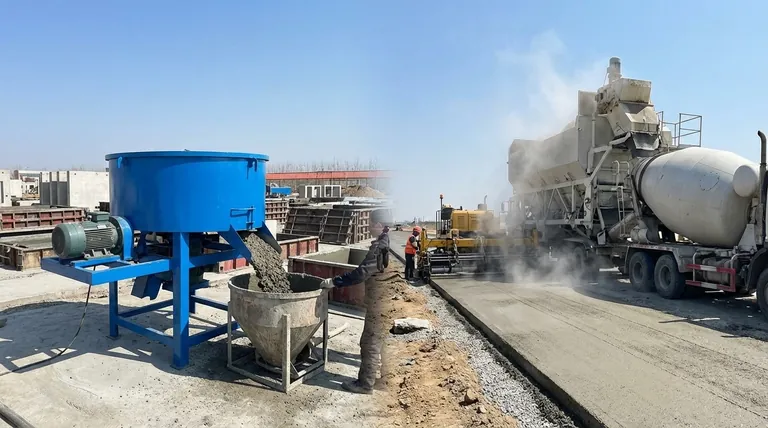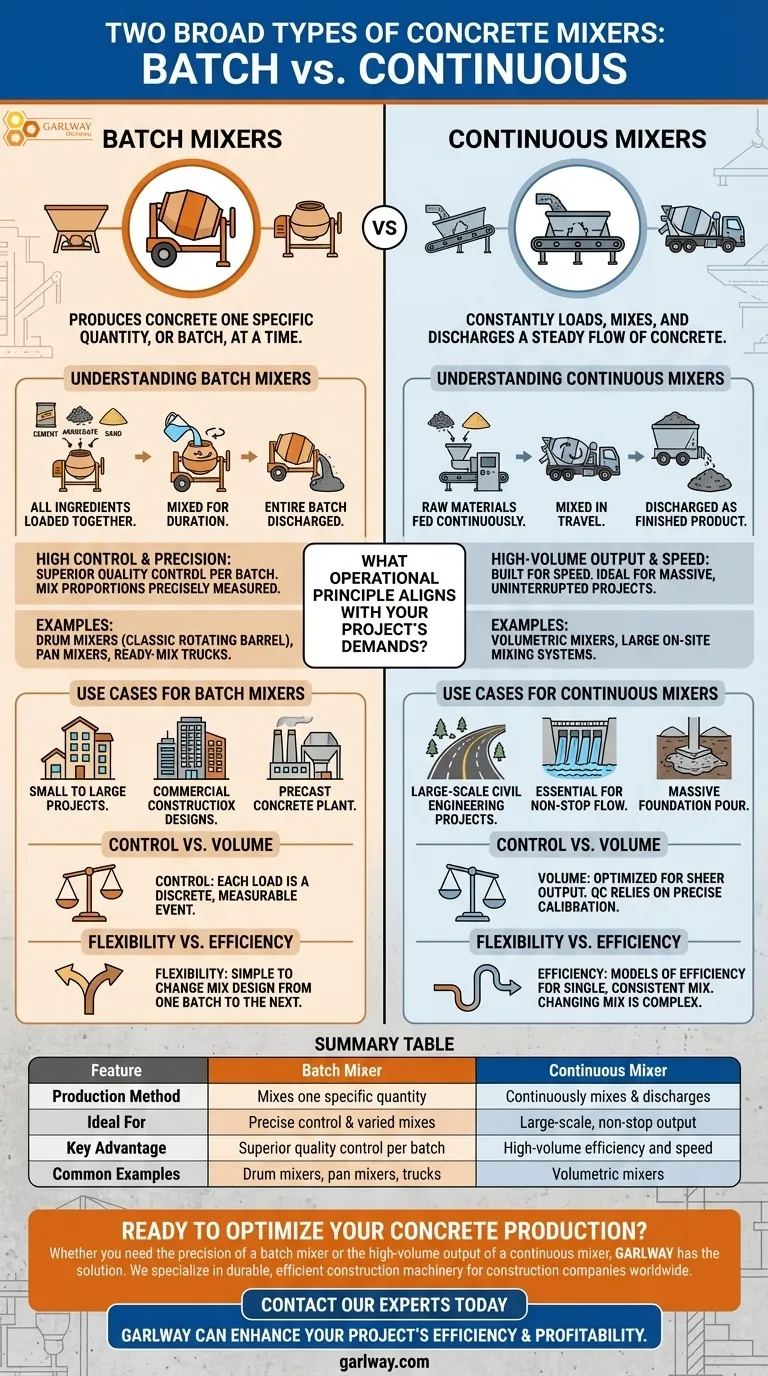The two primary types of concrete mixers are distinguished by their operational principle: they are batch mixers and continuous mixers. A batch mixer, as the name implies, produces concrete one specific quantity, or batch, at a time. In contrast, a continuous mixer constantly loads materials, mixes them, and discharges a steady flow of concrete until the job is complete.
The fundamental choice is not about which mixer is superior, but which operational principle aligns with the project's demands. Batch mixers offer precision and control for defined volumes, while continuous mixers provide high-volume output for large, uninterrupted jobs.

The Fundamental Divide: Batch vs. Continuous Production
The core difference between these two categories lies entirely in their method of production. This distinction influences everything from quality control to project scale and efficiency.
Understanding Batch Mixers
A batch mixer is a system where all ingredients—cement, aggregate, sand, and water—are loaded into the mixer together. The components are mixed for a specific duration, and then the entire completed batch is discharged.
This process allows for extremely high control over the quality and consistency of each individual batch. The mix proportions can be precisely measured before mixing begins.
Common examples of batch mixers include drum mixers (the classic rotating barrel style, including those on trucks) and pan mixers, which are common in precast concrete plants.
Understanding Continuous Mixers
A continuous mixer operates as an uninterrupted production line. Raw materials are fed into the machine continuously at one end, mixed as they travel through the equipment, and discharged as a finished product at the other.
This method is built for speed and high-volume output. It is ideal for massive projects that require a constant supply of concrete over a long period.
Volumetric mixers are a common type of mobile continuous mixer, capable of producing concrete on-site as needed.
Where Each Type Excels
The application of each mixer type is dictated by the scale and requirements of the construction project.
Use Cases for Batch Mixers
Batch mixers are the most common type, valued for their versatility and precision. They are ideal for small to large projects where specific quantities and mix designs are required.
This includes most residential and commercial construction, precast concrete manufacturing, and any job where multiple, distinct concrete mix designs might be needed throughout the day. A standard ready-mix concrete truck is a form of batch mixer.
Use Cases for Continuous Mixers
Continuous mixers are deployed for large-scale civil engineering projects. Their ability to produce a massive, uninterrupted flow of concrete is essential for applications like paving highways, building dams, or pouring large foundations.
They are also highly effective in remote locations, as volumetric mixers can bring the raw materials to the site and produce fresh concrete on demand, eliminating waste.
Understanding the Trade-offs
Choosing a mixing method involves balancing control, volume, and flexibility.
Control vs. Volume
Batch mixing offers superior, batch-by-batch quality control, as each load is a discrete, measurable event.
Continuous mixers are optimized for sheer volume. While modern systems are highly accurate, their quality control relies on the precise calibration of the continuous feed rates rather than pre-weighed batches.
Flexibility vs. Efficiency
Batch mixers provide excellent flexibility. It is simple to change the mix design from one batch to the next.
Continuous mixers are models of efficiency for a single, consistent mix. Changing the mix design is a more involved process of recalibrating the entire input stream.
Making the Right Choice for Your Goal
Understanding this core distinction empowers you to recognize the right production method for any task.
- If your primary focus is precision and varied mix designs for specific volumes: A batch mixer is the correct operational principle.
- If your primary focus is high-volume, rapid production for large-scale projects: A continuous mixer is designed for this purpose.
- If you are receiving concrete from a standard delivery truck on a construction site: You are using concrete produced via the batch mixing method.
Ultimately, knowing whether a project requires controlled batches or an uninterrupted flow is the key to matching the work with the right technology.
Summary Table:
| Feature | Batch Mixer | Continuous Mixer |
|---|---|---|
| Production Method | Mixes one specific quantity at a time | Continuously mixes and discharges concrete |
| Ideal For | Projects requiring precise control & varied mix designs | Large-scale projects needing high-volume, non-stop output |
| Key Advantage | Superior quality control per batch | High-volume efficiency and speed |
| Common Examples | Drum mixers, pan mixers, ready-mix trucks | Volumetric mixers |
Ready to optimize your concrete production?
Whether your project demands the precision of a batch mixer or the high-volume output of a continuous mixer, GARLWAY has the solution. We specialize in providing durable and efficient construction machinery, including concrete mixers and batching plants, for construction companies and contractors worldwide.
Contact our experts today to discuss your specific needs and discover how GARLWAY can enhance your project's efficiency and profitability.
Visual Guide

Related Products
- Ready Mixer Machine for Construction Ready Mix Machinery
- Portable Concrete Mixer Machine Equipment for Mixing Concrete
- HZS35 Small Cement Concrete Mixing Batch Plant
- Commercial Construction Mixer Machine for Soil Cement Mixing Concrete
- Hydraulic Concrete Mixer Machine Cement Mixing Equipment for Mixture Concrete
People Also Ask
- What was significant about Roscoe Lee's 1934 concrete mixer design? Pioneering Modular Construction Equipment
- What safety considerations are important for concrete mixer operation? A Guide to Proactive Risk Management
- Why is cleaning a concrete mixer after use important? Avoid Costly Repairs and Ensure Quality
- When was the first concrete mixer developed and by whom? Discover the 1900 Breakthrough
- What is the function of a concrete mixer machine? Achieve Consistent, High-Quality Concrete for Your Projects



















